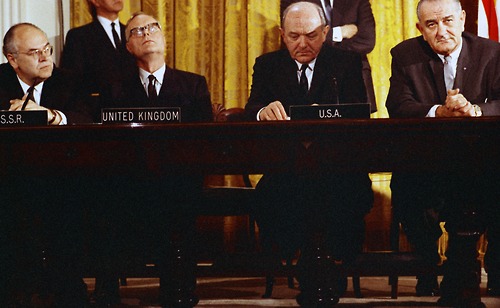With all the talk about private space enterprise and exploring the moon, the issue of who owns what and who can stake a claim to exploit space resources has become significant. I thought that this would be a good time to post a blog entry about the main treaty that governs exploration and exploitation of space.
The Treaty on Principles Governing the Activities of States in the Exploration and Use of Outer Space, including the Moon and Other Celestial Bodies was "opened for signatures" in the United States, the United Kingdom and the Soviet Union in January of 1967. As of the middle of last year, one hundred and two countries are participants in the treaty while another twenty seven signed the treaty but have not yet ratified it. The treaty forms the basic legal framework for international space law.
One of the primary features of the treaty is banning the signatories from placing weapons, nuclear or otherwise, in orbit around the Earth, on the Moon or on any celestial body or anywhere in outer space. It restricts the use of the Moon to peaceful purposes and explicitly prohibits the lunar testing of any weapons, the conducting of any military maneuver, the establishing of military bases, installations or fortifications of any kind. The treaty does not prevent the placing of conventional weapons in orbit.
Another feature of the treaty is the demand that the exploration of space and celestial bodies be done for the benefit of all countries and that there be no restriction on the exploration of space and celestial bodies by any of the signatories. All governments of signatory states are forbidden from staking a claim, by occupation, utilization or in any other way on any celestial body or zone of outer space because they are considered the "common heritage of mankind." Member States do have jurisdiction over any object that is launched into space but they are also responsible for any damaged caused by such an object. The activities of any non-governmental entity on any celestial body or zone of space shall require authorization and ongoing supervision by the State from which they launch. If a member State is concerned that the planned or executed activities of another member State in space would cause potentially harmful interference with the peaceful exploration and use of outer space and celestial bodies by other member States, the concerned State may call for a consultation of member States to resolve the issue.
In 1979, the Agreement Governing the Activities of States on the Moon and Other Celestial Bodies was drafted. This treaty would have turned jurisdiction of celestial bodies and orbits around them to the international community. This would have meant that outer space and celestial bodies would have to conform to international law, including the United Nations Charter. Among its provisions were a ban on exploration without approval of other States, a demand that any samples collected from a celestial body be available to other States, a ban on contaminating or deliberately altering the environment of any celestial body, bans ownership of any extraterrestrial property by any organization that is not international and governmental and requires that any resource extraction be made by an international organization. Unfortunately, this treaty failed to be ratified by any of the major space-faring nations.
It may be possible to mine tritium on the Moon for use in terrestrial fusion reactors which would make the moon the source of a very valuable material. Now that private companies are planning on visiting the moon, the question of ownership of property and resources in outer space is very relevant.
Signing of the Outer Space Treaty in 1967:
